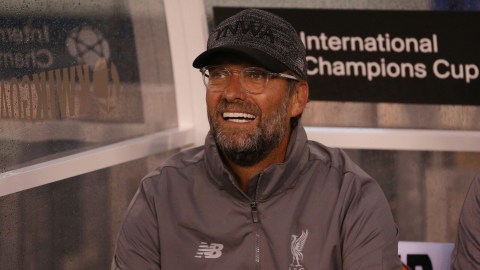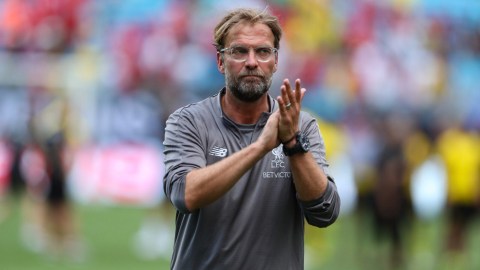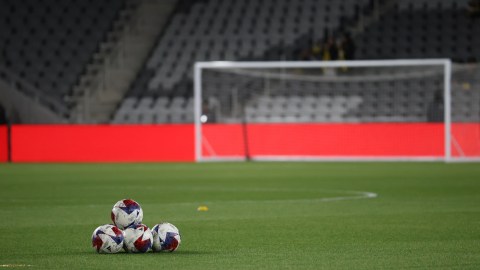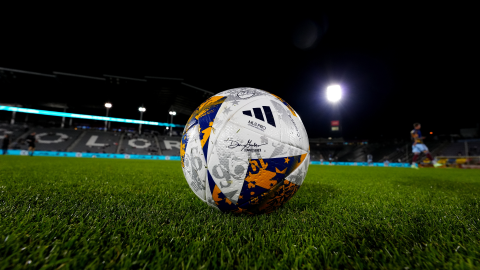 The summer transfer window is closed. All is quiet as the dust settles and the flow of rumors slows to a drip.
The summer transfer window is closed. All is quiet as the dust settles and the flow of rumors slows to a drip.
This summer, Premier League teams spent a record-high £630 million ($979.2 million) on new players. It all ended Monday with the mad scramble of deadline-day transfer activity that saw Premier League teams shell out £140 million ($217.6 million) — another record high, according to the BBC.
The record outlay doesn’t necessarily mean the Premier League has improved. It merely shows that the 20 teams are flush with cash (to some degree), and they’re willing to use it to improve their rosters.
Now that the summer transfer market is closed, it’s time to assess all the activity involving Premier League clubs and hand out some grades (editor’s note: This is the second of a two-part review. Click here for the first part.)
Manchester United: C
The summer transfer window of 2013 will live in infamy, as far as Manchester United is concerned. United failed to land any of its main transfer targets and only secured Marouane Fellaini‘s signature minutes before the window shut. Pundits are slamming United’s new regime (led by CEO Edward Woodward and manager David Moyes), saying this is the kind of start to the post-Sir Alex Ferguson era that they did not want.
However, there’s a silver lining in all of this. United is still in position to challenge for domestic and European honors, despite its market missteps. The players who won the league by some distance last season remain at Old Trafford, including Wayne Rooney. Keeping him out of Chelsea’s clutches was perhaps United’s most important piece of business. Meanwhile, Fellaini adds quality and physical presence to the midfield, and the rest of the squad is balanced with a good blend of youth and experience.
United’s frantic deadline-day performance won’t win it any admirers, nor will its failed pursuit of La Liga’s stars. However, United didn’t weaken itself during a window marked by market mistakes. It strengthened a strong squad, albeit only marginally.
Newcastle United: D
Unlike Manchester United, Newcastle battled relegation last season and was in no position idle during the summer transfer window. Yet that’s what the Magpies did under the leadership of its new director of football Joe Kinnear and its embattled manager Alan Pardew.
Newcastle signed talented striker Loic Remy (on loan) from QPR in a bit of ironic symmetry. Remy nearly joined Newcastle during the winter transfer window, but QPR hijacked the move just hours before it was set to be completed. QPR was relegated, and Remy chose to join Newcastle rather than play in the Championship (second division). He adds much-needed quality and depth to the front line.
But Newcastle’s problems run far deeper than a lack of attacking options. Danny Simpson and James Perch, both regulars last season, have departed, and Newcastle failed to replace the duo. Pardew says financial limitations are behind his team’s lack of activity. This is hard to believe, as increased television revenue has sparked record transfer spending across the top flight.
Norwich City: B
Norwich relied on a stingy defense to secure Premier League survival last season, so it devoted much of its summer business to making improvements going forward. The Canaries sold longtime goal-scoring hero Grant Holt to Wigan, but they added Ricky Van Wolfswinkel, Nathan Redmond, Gary Hooper and Leroy Fer. How quickly they gel and produce will determine how history judges Norwich’s summer transfer activity, but the early signs are encouraging.
Southampton: B-
Southampton manager Mauricio Pochettino showed a lot of faith in the players who achieved a 14th-place finish last season, as he only made three additions during the summer transfer window. But the Southampton boss expects the three — Dejan Lovren, Victor Wanyama and Pablo Daniel Osvaldo — to be key contributors this season, and fans feel the same way, considering Southampton spent around £35 million ($54.6 million) on the trio.
While the Saints added three starters, they discarded 12 players. All but Jason Puncheon, who joined Crystal Palace on loan, were squad players or reserves. This culling operation frees up resources to use in future windows, but it leaves the Saints with a dangerously thin squad. Injuries or long-term bans could cripple their efforts to fortify their Premier League status. Until that actually happens, the summer window will look like a positive one.
Stoke City: C+
Stoke City replaced longtime manager Tony Pulis with Mark Hughes after last season, but the new boss has largely stuck with his predecessor’s favorites. Dean Whitehead and Cameron Jerome are gone, but Stephen Ireland, Oussama Assaidi and Marko Arnautovic have come to the Brittania Stadium in order to freshen up the attack. Dutch international Erik Pieters has slotted into the starting lineup in defense.
Many expect Hughes to change Stoke’s notoriously robust style of play into a more eye-pleasing one. That will take some time, as the Potters’ summer business suggests it will be a case of evolution, rather than revolution.
Sunderland: B-/C+
Paolo Di Canio‘s first act as Sunderland manager was to keep his team in the Premier League. His next task was to re-shape the squad in his own image. The Italian taskmaster signed 13 players and shipped out 10 in his first window in charge. He would have made more changes had the window remained open longer.
There’s no telling how this will all play out. Many of the new recruits don’t have big reputations — American striker Jozy Altidore and Italians Emanuele Giaccherini and Fabio Borini are the headliners — but they all are looking to make an impact in the Premier League.
The departures of goalkeeper Simon Mignolet, playmaker Stephane Sessegnon and midfielders James McClean and Alfred N’Diaye leave holes in the squad. Only Di Canio knows if the new players have adequately filled them. Sunderland gets a decent grade because Di Canio did what he set out to do over the summer — for better or for worse.
Swansea City: B+
Swansea’s summer window opened with clouds of doom, as chairman Huw Jenkins and manager Michael Laudrup appeared to fall out over transfers in June. The two soon came to an understanding, and Swansea made upgrades to a squad that finished ninth and won the League Cup.
The Swans retained Ashley Williams, Michu and Jonathan De Guzman, despite the reported interest of bigger clubs. Four squad players departed, but 10 new arrivals bolstered the ranks ahead of a campaign which will see the Swans compete in Europe.
Wilfred Bony and Jonjo Shelvey add competition and versatility to the attack. Laudrup also raided Spain — the country in which he used to work — for a number of young players with rich pedigrees. Judging by last season’s results, we have to think a few of them will make an impact in England’s top flight.
Tottenham Hotspur: B
Tottenham was a lead actor in the summer transfer saga, as it broke its transfer record three times as part of a £100-plus ($156 million) spending spree. However, this was all in response to the inevitable departure of Gareth Bale, who joined Real Madrid for a world-record fee on deadline day.
It’s impossible to overstate Bale’s importance, so manager Andre Villas-Boas didn’t even try to find a like-for-like replacement. Instead, seven new players, including five with international reputations, have come to White Hart Lane. It’s not yet clear if their arrivals will take Tottenham to the next level.
Nine of the 15 players who departed over the summer contributed to last season’s fifth-place finish, which suggests Spurs may have added quality but lost quantity. They will be fighting for trophies on four fronts, and Villas-Boas will need to rest and rotate players throughout the season.
West Bromwich Albion: B+
West Brom will be hard-pressed to repeat last season’s eighth-place finish, but the Baggies should comfortably remain in the Premier League after strengthening in the summer transfer market. Nicolas Anelka, Matej Vydra and Victor Anichebe will bolster the forward lines and offset the losses of Romelu Lukaku and Peter Odemwingie.
Veteran defender Diego Lugano could make an already stingy defense even better, while Stephane Sessegnon and Scott Sinclair add creativity to the midfield. West Brom should have an improved defense and a more flexible and creative attack this season.
Goalkeeper is the only area of concern, as Lee Camp was brought in to fill in for the injured Ben Foster. Manager Steve Clarke could have done better on that front, but he should be happy with his team’s summer business overall.
West Ham United: C+
West Ham finished 10th in its return to the Premier League. Manager Sam Allardyce only added five players to his squad, with Andy Carroll and Stewart Downing serving as the most high-profile arrivals. Allardyce hopes the former Liverpool duo will increase the Hammers’ goal tally.
Carlton Cole and Gary O’Neil left the club, and it appears Allardyce will fill their shoes by committee. The manager has shown faith in the group with which he has worked for the last few years. The club shouldn’t gain or lose any ground because of its summer business.
Check out Part 1 of our summer transfer market grades>>
Have a question for Marcus Kwesi O’Mard? Send it to him via Twitter at @NESNsoccer or @mkomard, his Facebook page or NESN Soccer’s Facebook page or send it here. He will pick a few questions to answer every week for his mailbag.
Photo via Facebook/Marouane Fellaini



